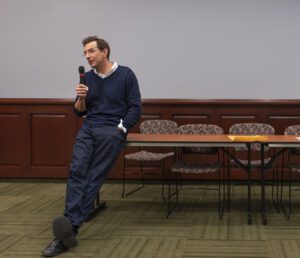Los Angeles Times reporter Christopher Goffard did not have any podcast experience when he started working on Dirty John in 2017, but he didn’t let that stop him from creating the series on his terms.
The result was one of the most successful podcasts to date, with more than 53 million downloads, and a wave of true crime podcasts following in its footsteps.
Goffard visited Penn State University on November 13 to share his reflections on Dirty John in a lecture titled “10 Things I Learned From My First Podcast.” His visit was sponsored Penn State’s Donald P. Bellisario College of Communications.

From Reporter to Podcaster
Making Dirty John pushed Goffard, a longtime print reporter, outside of his comfort zone in the same way that writing his first book did. He embraced the challenge of doing something new and encouraged the students in the audience to do the same thing.
“Your comfort zone will kill you,” Goffard said. “Every time you succeed, your world of possibility expands a little bit.”
The story of “Dirty” John Meehan began as a long-form written story for the Los Angeles Times called “Dirty John’s Last Con.” At the same time Goffard submitted his draft in March 2017, the Times was looking for its next podcast project with Wondery.
Goffard had no previous podcast experience, but said he always writes his stories to be written aloud and reads every sentence multiple times before ever hits the page or the screen. He applied that experience to writing the scripts for Dirty John and quickly received a crash course in audio recording.

Several of his tips during the presentation centered around avoiding common technical mistakes in podcasting like being mindful of background noise and resisting the urge to say things like “uh-huh” while conducting interviews.
He learned many of these things the hard way during the production of Dirty John.
“Always beware of the cat,” Goffard said as the crowd began to laugh. He went on to explain that he had to re-record a lengthy interview for Dirty John because the subject’s cat was carrying on in the next room during the first interview and the footage was unusable.
Because he did not come to podcasting through radio reporting, Goffard was not shy about pushing back against best practices like having sentences that were too long or giving up Dirty John’s narration to a professional with a more well-trained voice.
In the end, he wrote more than 50,000 words for the show’s script, did push-ups to improve vocal delivery and kept a picture of his daughter in the recording studio to convey a sense of emotion during the gripping parts of the story.
The Complicated Relationship Between Podcasts and Newspapers

Goffard hopes that the success of podcasts at the Los Angeles Times will help drive subscribers to the newspaper to learn about things not fit into a podcast — like city government, community issues and daily coverage of crime and courts.
He cited research from the Knight Foundation and the University of North Carolina, which found that 225 counties in the United States are “news deserts,” or places that do not have a local newspaper.
He also pushed back against the notion that news stories need to be filled with clickbait to capture a reader’s attention, citing the push toward bite-sized pieces of information, rather than longer, more information-rich narratives like those he’s best at writing.
“The hope is that listeners will be drawn to quality journalism, subscribe, get smarter, and save democracy,” Goffard said. “Journalism is about more than chartacles and listicles. You have to earn people’s attention, but you don’t have to surrender basic principles to do so.”
As a lifelong print reporter, Goffard was not — and perhaps still is not — being part of the story. In both Dirty John and his new series, Detective Trapp, he seems himself as the narrator rather than a character in the story. He encouraged journalism students to approach their work in the same way.
“It doesn’t have to be about you,” he said, adding that he tries to make himself feel small when he does interviews and sees himself as a windowpane through which readers or listeners can see events unfold.
Introducing Detective Trapp

Goffard’s new series, Detective Trapp, profiles Anaheim homicide detective Julissa Trapp, whom he first met in 2016. Trapp is the only female homicide detective in the Anaheim Police Department, and the team’s longest-serving member.
He was intrigued by her story, but put it on hold to produce Dirty John. He’s spent the past year interviewing Trapp at length, along with her family, friends, colleagues and people she’s represented.
“I became especially interested in her willingness to dive into the pain of the victims’ families and absorb it and use it as fuel, while other homicide detectives built self-protective firewalls against the awfulness they witnessed year after year,” Goffard wrote in an article about the show. “As I got to know her, it was hard to miss her talent as a chameleon — her ability to turn herself into who she needed to be for the job at hand.”
As the new series launches, Goffard said he’s feeling pressure to match the success of Dirty John, even though he never expected it to become as successful as it did. He credits John Meehan’s story with much of that success, rather than anything he did to promote the show.
At a time when seemingly every podcaster is looking to stand out from the crowd and grow their audience, Goffard said a compelling, well-produced story will do much more than any promotional campaign ever could.
“It’s about the story, now and always,” he said. “ Unless you’re a college professor, you can’t force people to read what you want to read or listen to what you want them to listen to. You shouldn’t tell people they have to listen to your podcast, to earn people’s attention.”




Join the Movement